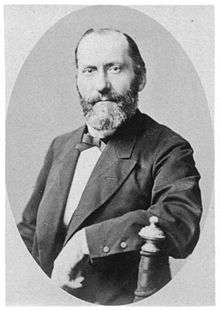Ernst Schering Prize
The Ernst Schering Prize is awarded annually by the Ernst Schering Foundation for especially outstanding basic research in the fields of medicine, biology or chemistry anywhere in the world. Established in 1991 by the Ernst Schering Research Foundation, and named after the German apothecary and industrialist, Ernst Christian Friedrich Schering, who founded the Schering Corporation, the prize is now worth €50,000. [1]

Ernst Schering
Recipients
Source: Schering Foundation
- 2019 Patrick Cramer, (Director at the Max Planck Institute for Biophysical Chemistry in Göttingen)
- 2018 Bonnie L. Bassler, {Princeton University, New Jersey}
- 2017 Elly Tanaka, (Senior Scientist at Research Institute of Molecular Pathology in Vienna, Austria)
- 2016 Franz-Ulrich Hartl, (Max Planck Institute of Biochemistry in Martinsried, Germany).[2]
- 2015 David MacMillan, (Professor of Chemistry at Princeton University, USA).
- 2014 Magdalena Götz, (Director of the Institute of Stem Cell Research at the Helmholtz Zentrum München and chair of Physiological Genomics at the University of Munich (LMU) in Munich, Germany)
- 2013 Frank Kirchhoff, (Institute of Molecular Virology at the Ulm University Medical Center in Ulm, Germany)
- 2012 Matthias Mann, (Max Planck Institute of Biochemistry in Martinsried, Germany)
- 2011 Bert W. O'Malley, (Tom Thompson Distinguished Service Professor and Chair of Molecular and Cellular Biology at Baylor College of Medicine in Houston, Texas)
- 2010 Marc Feldmann and Sir Ravinder Maini, (Kennedy Institute of Rheumatology at Imperial College London, UK)
- 2009 Rudolf Jaenisch, {Whitehead Institute, Cambridge, MASS, USA}
- 2008 Klaus Rajewsky, (Harvard Medical School, Boston, USA)
- 2007 Carolyn Bertozzi, (University of California, Berkeley, USA)
- 2006 Wolfgang Baumeister, (Max Planck Institute of Biochemistry in Martinsried, Germany)
- 2005 Thomas Tuschl, (Laboratory of RNA Molecular Biology, Rockefeller University, New York)
- 2004 Ronald McKay, (National Institute of Neurological Disorders and Stroke (NINDS), Bethesda, MD, USA)
- 2003 Svante Pääbo, (Max Planck Institute for Evolutionary Anthropology in Leipzig, Germany)
- 2002 Ian Wilmut, (The Roslin Institute in Edinburgh, UK)
- 2001 Kyriacos Nicolaou, (University of California, San Diego, CA, and The Scripps Research Institute, La Jolla, CA, USA)
- 2000 Takao Shimizu, (University of Tokyo, Japan)
- 1999 Michael Berridge, (Babraham Institute in Cambridge, UK)
- 1998 Ilme Schlichting, (Max Planck Institute for Molecular Physiology in Dortmund, Germany)
- 1997 Johann Mulzer, (Institute for Organic Chemistry, University of Vienna, Austria)
- 1996 Judah Folkman, (Harvard Medical School, Harvard University, Boston, USA)
- 1995 Yasutomi Nishizuka, (Kobe University, Japan)
- 1994 Bert Vogelstein, (Oncology Center, Johns Hopkins University, Baltimore, MD, USA)
- 1993 Christiane Nüsslein-Volhard, (Max Planck Institute for Developmental Biology in Tübingen, Germany)
- 1992 Peter H. Seeburg, (Center for Molecular Biology, University of Heidelberg, Germany)
gollark: I'd like to just entirely drop os.loadAPI in potatOS, since it makes for a ton of flaky potatoBIOS code, but I think shell would break.
gollark: Or go to great lengths to virtualize environments/FSes exactly as programs want them using YAFSS or something.
gollark: You probably have to be able to make people adapt their programs a *bit*.
gollark: What if you just virtualize the filesystem for every single program?
gollark: Because of weirdness with `require` half my programs have fallbacks to `dofile`.
See also
References
- "Ernst Schering Prize". Ernst Schering Foundation. Archived from the original on 18 January 2015. Retrieved 16 January 2015.
- Ernst Schering Preis 2016
This article has been translated from the equivalent article on German Wikipedia
This article is issued from Wikipedia. The text is licensed under Creative Commons - Attribution - Sharealike. Additional terms may apply for the media files.